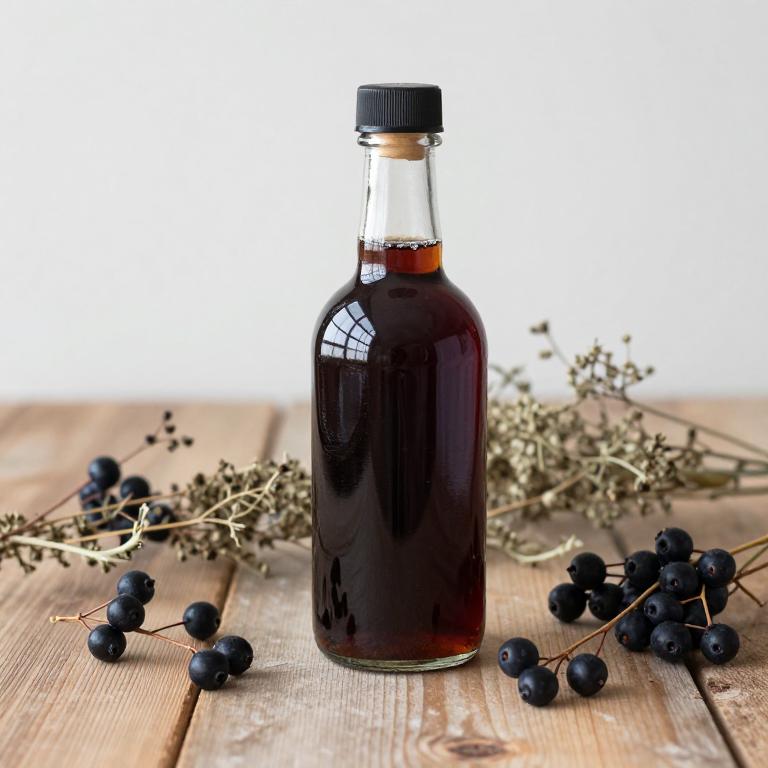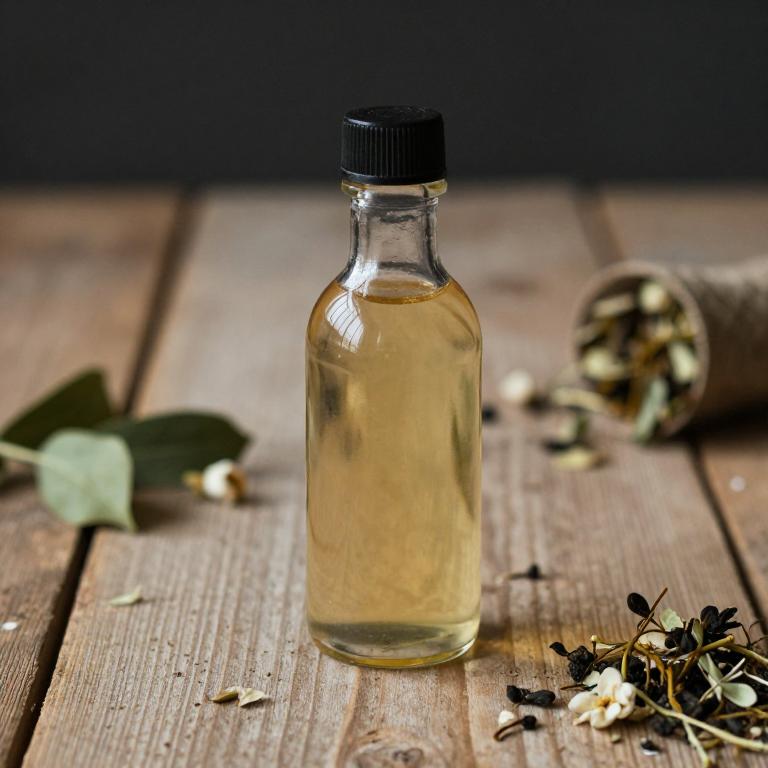10 Best Herbal Syrups For Sore Throat

Herbal syrups are popular natural remedies for soothing sore throats, often containing ingredients like honey, ginger, echinacea, and licorice root, which have anti-inflammatory and antimicrobial properties.
These syrups can help reduce throat irritation, ease swallowing, and provide a calming effect due to their soothing texture and flavor. Many herbal syrups are available over-the-counter and are generally considered safe for most adults and children, though it's important to check for age-appropriate formulations. They are often used as a complementary treatment alongside other remedies such as warm liquids or lozenges.
However, individuals with allergies or specific health conditions should consult a healthcare provider before using herbal syrups.
Table of Contents
- 1. Licorice (Glycyrrhiza glabra)
- 2. Ginger (Zingiber officinale)
- 3. Salvia (Salvia officinalis)
- 4. Peppermint (Mentha piperita)
- 5. Thyme (Thymus vulgaris)
- 6. Black elderberry (Sambucus nigra)
- 7. Echinacea (Echinacea purpurea)
- 8. Fennel (Foeniculum vulgare)
- 9. Black pepper (Piper nigrum)
- 10. Camellia (Camellia sinensis)
1. Licorice (Glycyrrhiza glabra)

Glycyrrhiza glabra, commonly known as licorice, has been traditionally used in herbal medicine for its soothing properties, particularly in relieving sore throat symptoms.
The active compounds in licorice root, such as glycyrrhizin and flavonoids, possess anti-inflammatory and antiviral effects that help reduce throat irritation and inflammation. When prepared as a syrup, glycyrrhiza glabra provides a convenient and effective way to deliver these beneficial compounds directly to the throat. However, long-term use of licorice syrup may lead to side effects such as increased blood pressure due to its effects on the adrenal glands.
As a result, it is often recommended to use licorice syrup under the guidance of a healthcare professional, especially for individuals with hypertension or other underlying health conditions.
2. Ginger (Zingiber officinale)

Zingiber officinale, commonly known as ginger, has been traditionally used for its soothing properties to alleviate sore throat symptoms.
Ginger herbal syrups are made by infusing fresh or dried ginger root into a base of sugar and water, creating a thick, aromatic syrup. These syrups are valued for their anti-inflammatory and antioxidant properties, which can help reduce throat irritation and inflammation. The warming effect of ginger may also provide relief by stimulating circulation in the throat area.
When used as a natural remedy, ginger syrup can be a gentle and effective option for easing discomfort from sore throats, especially when combined with other herbal ingredients like honey or licorice.
3. Salvia (Salvia officinalis)

Salvia officinalis, commonly known as sage, has been traditionally used for its soothing properties, and herbal syrups made from this plant are often recommended for relieving sore throat symptoms.
These syrups typically contain extracts of the leaves, which are rich in antioxidants and anti-inflammatory compounds that can help reduce throat irritation and inflammation. The expectorant and antimicrobial properties of sage may also help clear mucus and combat infections that contribute to sore throats. When used as a complementary therapy, sage syrup can provide natural relief without the side effects associated with some pharmaceutical options.
However, it is important to consult a healthcare provider before using sage syrup, especially for children or individuals with existing health conditions.
4. Peppermint (Mentha piperita)

Mentha piperita, commonly known as peppermint, is often used in herbal syrups to alleviate symptoms of sore throat due to its soothing and antiseptic properties.
These syrups typically combine peppermint oil with honey or glycerin to create a thick, aromatic formulation that can be easily administered. The cooling effect of peppermint helps to reduce inflammation and numb the throat, providing temporary relief from pain and irritation. Additionally, the antibacterial properties of peppermint may help combat infections that contribute to sore throat.
While generally safe for adults and children, it is advisable to consult a healthcare provider before use, especially for those with allergies or specific medical conditions.
5. Thyme (Thymus vulgaris)

Thymus vulgaris, commonly known as thyme, is a popular herb used in the preparation of herbal syrups for sore throat due to its potent antimicrobial and anti-inflammatory properties.
These syrups typically contain essential oils extracted from thyme, particularly thymol, which helps to reduce throat irritation and combat bacterial infections. The soothing effect of thyme syrup makes it a natural remedy for alleviating symptoms such as coughing, hoarseness, and inflammation in the throat. Many people use thymus vulgaris syrups as a gentle alternative to over-the-counter pain relievers and antibiotics.
When used regularly, these syrups can provide relief and support the body's natural healing process in cases of mild to moderate sore throat.
6. Black elderberry (Sambucus nigra)

Sambucus nigra, commonly known as the European elderberry, is often used in herbal syrups to alleviate symptoms of a sore throat due to its high concentration of antioxidants and anti-inflammatory compounds.
These syrups are typically made by combining dried elderberries with honey, ginger, and other soothing ingredients to create a pleasant and effective remedy. The antioxidants in elderberries may help reduce inflammation and boost the immune system, supporting the body's natural defenses against viral infections. Many people find relief from sore throat discomfort by using these syrups regularly, especially during cold and flu season.
However, it is important to consult with a healthcare professional before use, particularly for children, pregnant women, or individuals with underlying health conditions.
7. Echinacea (Echinacea purpurea)

Echinacea purpurea herbal syrups are commonly used to support immune function and alleviate symptoms of sore throat by reducing inflammation and inhibiting viral replication.
These syrups are derived from the dried flowers, leaves, and roots of the echinacea plant, which is native to North America. Clinical studies suggest that echinacea may help shorten the duration of colds and sore throats, though results can vary among individuals. When used as a natural remedy, echinacea syrups are often preferred for their mild flavor and ease of consumption, especially by children and adults alike.
However, it is important to consult with a healthcare provider before use, particularly for those with allergies or taking other medications.
8. Fennel (Foeniculum vulgare)

Foeniculum vulgare, commonly known as anise, is often used in herbal syrups to alleviate symptoms of a sore throat due to its expectorant and antispasmodic properties.
The essential oils in anise, particularly anethol, have mild analgesic effects that can help reduce throat pain and inflammation. These syrups are typically prepared by steeping dried anise seeds in sugar or honey, creating a soothing and aromatic remedy. They are especially effective for dry, hacking coughs and can provide relief when consumed warm.
However, individuals with allergies to related plants or those with diabetes should consult a healthcare provider before using anise-based syrups.
9. Black pepper (Piper nigrum)

Piper nigrum, commonly known as black pepper, is often used in herbal syrups to alleviate symptoms of a sore throat due to its anti-inflammatory and analgesic properties.
The active compound, piperine, helps reduce swelling and pain in the throat lining, making it a popular natural remedy. These syrups are typically prepared by combining black pepper with honey, ginger, or other soothing herbs to enhance their effectiveness. While generally safe, they should be used with caution in individuals with stomach ulcers or those taking blood-thinning medications.
Piper nigrum herbal syrups offer a gentle, alternative approach to managing sore throat discomfort without the side effects of conventional pharmaceuticals.
10. Camellia (Camellia sinensis)

Camellia sinensis, the plant from which green and black teas are derived, is the source of various herbal syrups that are traditionally used to soothe sore throats.
These syrups often contain extracts of Camellia sinensis leaves, which are rich in antioxidants and anti-inflammatory compounds that can help reduce throat irritation and inflammation. The soothing properties of these syrups are believed to come from their high concentration of polyphenols, such as catechins, which have antimicrobial and healing effects. Many people use Camellia sinensis-based syrups as a natural remedy for sore throats caused by colds, infections, or excessive vocal strain.
While they are generally safe, it is advisable to consult a healthcare professional before using them, especially for children or individuals with existing health conditions.